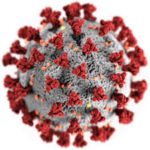Coronavirus Update 4/1/20
In one sense, it’s frustrating to have to write about coronavirus again.
In another, as a health-care professional, I’m happy the world at large is focused on this health problem because it provides us with a great opportunity to address underlying health issues that contribute to mortality amidst seasonal flu-virus infections.
I’ve received a few questions about coronavirus and “what we’re supposed to do”.
Since everyone’s situation is different and since my job isn’t to discuss the validity of laws and the wisdom of policymakers let me say this much.
Social distancing: It’s not a bad idea to maintain social distance when you feel poorly. I think that too many times people he ad out to a grocery store or a restaurant without thinking about the ramifications of spreading their illness.
Every single year millions of people are negatively affected because of people’s decision to head outside while coughing and sniffling.
Should you practice social distancing?
It may be wise if you have an underlying health condition (like asthma, high blood pressure, type 2 diabetes, or are a smoker), or have regular interactions with individuals who have those conditions.
Is it unwise to visit a friend for a moment at their home? If you feel well and the other person does too, and neither of you interacts with at-risk individuals I wouldn’t rule it out.
Washing hands: Yes, this is quite important and it’s amazing to me how many people forget this. Viruses like COVID-19 have a layer of fats that help form the structure of the virus. Contact with soap breaks up that phospholipid layer and kills them on contact.
Which means if you’re concerned about contamination, washing all surfaces of your hands for 20-30 seconds will neutralize COVID-19.
But guess what…it’ll also neutralize other viruses, which is a great reason to wash your hands every day.
No need to panic: While the uncertainty of the nation’s economic situation is clearly a point of concern, the truth is we’re gathering folders full of information on the virus.
As we test more and more you’ll see the number of cases increase. That’s a good thing as you’ll see because it shows the virus is far less deadly than we’ve been led to believe by the media.
Like I said in my previous article, the coronavirus has probably been here for months and I wouldn’t be surprised if millions of people have been infected. Perhaps even yourself.
That means the mortality rate is probably much lower than the media is letting on.
I wouldn’t be surprised if the coronavirus ends up looking like a really bad flu year and little more.
Those are just a few things I’d like to emphasize before addressing something I think will help people with an underlying health issue that elevates the risk of complications from coronavirus infection.
Why Asthmatics Are at Risk of Coronavirus Infection And Simple Ways to Potentially Decrease Complications
COVID-19 is like most flu-viruses as its infection presents difficulty for people who have underlying health conditions, especially those that are related to pulmonary function.
We know asthmatics may have problems with fighting off a coronavirus infection.
The inflammation in the airways that are associated with asthma attacks can be further worsened when the body’s immune system is assaulted with a virus-like COVID-19.
When I work with asthmatics in my clinic, what I typically tell them to do to help reduce the severity of their symptoms, and the frequency of attacks are the following.
>> Follow an elimination diet
>> Use vitamin D-3 to boost immune health (next week we’ll be running a sale on vitamin D-3)
>> Use magnesium as a bronchodilation tool
Let me show you why these processes can help, and how adopting these practices today could help asthmatics fight off a coronavirus infection.
1 – Elimination Diets:
The practicality of an elimination diet for asthmatics is the elimination of inflammatory foods like gluten and dairy help to relieve auto-immune issues. Oftentimes, the frequency and intensity of asthma attacks has to do with rampant inflammation in the body.
By taking gluten and dairy out of the equation it allows the body’s immune system to respond appropriately to legitimate threats to the immune system and may result in the cessation of asthma attacks.
One of the most dramatic results of an elimination diet I’ve ever seen was published by Dr. Mark Hyman.
He wrote:
“I saw a patient in the other day. She was 42 years old. She had actually died twice from respiratory symptoms due to her allergies. We call it anaphylaxis, which is a severe allergy reaction.
She had to be coded with paddles to revive her. She was taking 42 different sprays, pills, and potions every day, which had been prescribed by top doctors at Harvard. She had seen the lung doctor, the immunologist, and the allergist. Everybody was trying to fix her and no one could, because they weren’t asking the right questions. They were trying to suppress the inflammation rather than trying to address the cause of the inflammation, a very different perspective. That’s the perspective we take in Functional Medicine: getting to the root cause.
When this patient came to see me, I ran some tests in order to understand exactly what was irritating her immune system. I looked for the common causes and asked a few simple questions. Is it food allergies? Is it environmental allergens? Is it mold? Is there something wrong with the bacteria and microbes in her gut? Is it a toxin? What about stress or a poor diet? All of these things are potential triggers for asthma and all chronic disease.
In her case, I found out that she had very high antibodies to gluten, an indication that she had celiac disease, which turned out to be the root cause of her asthma. This was completely missed by the top medical school and university in the country, because they don’t think that food might have something to do with disease. It’s just not something they are taught to look for in medical school.
One Harvard doctor said to me, “if food was medicine, I would have learned about it in medical school”.
So, what did I do for her? I simply removed the things that were causing the problem. I got rid of the gluten, cleaned up her gut, and got rid of the bad bugs. Then, I put in good bugs and nutrients, like fish oil, vitamin C, and zinc. A few simple things helped restore and balance her body, and within six weeks, she was off every medication, she had no symptoms, no allergies, no hives, and no asthma.”
I’ve never seen a case that bad, but suffice it to say, I’ve helped dozens of asthmatics manage their condition doing little more than getting rid of gluten and dairy.
2 – Use Vitamin D-3 To Support Immune Health:
Vitamin D-3 is one of the most significant immune-modulators.
And as I wrote about in an article last week, high-dose vitamin D-3 is something we’re exploring to help with auto-immune conditions (which asthma can be classified as).
As the Cochrane Library recently reported, there is strong evidence that supports vitamin D-3 can be used to help reduce the severity of asthma attacks.
They wrote:
“randomized trials that taking an oral vitamin D supplement in addition to standard asthma medication is likely to reduce severe asthma attacks.
…
Low blood levels of vitamin D have been linked to increased risk of asthma attacks in children and adults with asthma. There has been a growing interest in the potential role of vitamin D in asthma management, because it might help to reduce upper respiratory infections (such as the common cold) that can lead to exacerbations of asthma. Several clinical trials have tested whether taking vitamin D as a supplement has an effect on asthma attacks, symptoms, and lung function in children and adults with asthma.
…
The researchers found that giving an oral vitamin D supplement reduced the risk of severe asthma attacks requiring hospital admission or emergency department attendance from 6% to around 3%. They also found that vitamin D supplementation reduced the rate of asthma attacks needing treatment with steroid tablets.”
In general, taking vitamin D-3 to support a healthy immune response is one of the smartest things anyone can do.
We need vitamin D-3 to complete various biologically essential processes, and many of them are related to immune health, so to add it to your diet today (especially as an asthmatic) is a great way to bolster your body’s response to pathogens.
3 – Use Magnesium:
One more thing I think anyone with asthma should consider is upping their magnesium intake.
As I’ve mentioned time and time again, magnesium is one of the most important minerals you could ever supplement with as it’s important to more than 300 biological processes.
The vast majority of Americans are deficient in it as soil quality doesn’t impart nearly as much magnesium into food as it used to.
When it comes to having healthy airways, and asthma attacks, magnesium is considered a great adjuvant to drugs.
Here’s what two researchers published about magnesium and the treatment of asthma:
“Magnesium seems to be beneficial in the treatment of moderate to severe asthma in adults and children. It is a safe drug to administer, but there have been minor side effects reported, such as epigastric or facial warmth, flushing, pain and numbness at the infusion site, dry mouth, malaise, and hypotension. Owing to its bronchodilating and anti-inflammatory effects, magnesium is an encouraging adjuvant therapy for pediatric patients who do not respond to conventional treatment in acute severe exacerbations. Future studies should focus on establishing the optimal dosage for maximal benefits and the best route of administration. Magnesium should also be considered as a prophylactic treatment.”
Don’t forget this either; magnesium is essential for immune health too, without maintaining proper magnesium levels it’s nearly impossible to mount a sufficient immune response, asthmatic or not.
Coronavirus Conclusion
That was an exhaustive article, I know, and it may not have covered all the subject material you were hoping it would.
Don’t worry, we’re going to be providing you with multiple articles about coronavirus over the next few weeks.
My #1 recommendation?
Don’t panic.
#2 is do all you can to stay healthy.
The affordable things you can do are modifying your diet (eliminate inflammatory foods), exercise, sleep well, and practice stress-relieving techniques like meditation.
Past that, supplements and other immune-boosting techniques should round out the mix.
Hopefully that helps and I’ll talk to you more about coronavirus in a future article.


